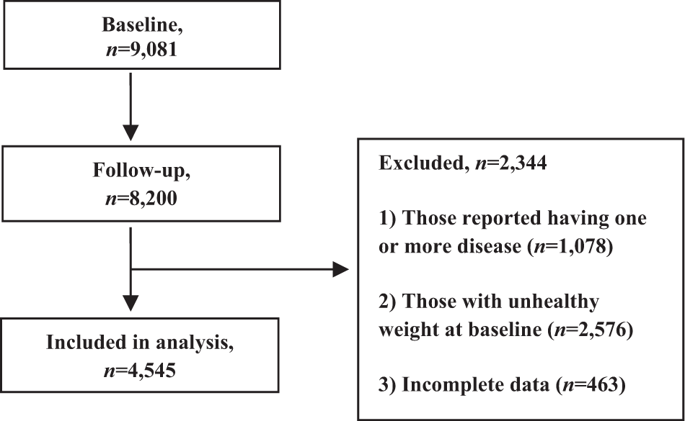European Journal of Clinical Nutrition ( IF 4.7 ) Pub Date : 2019-11-22 , DOI: 10.1038/s41430-019-0532-8 Haya M Aljadani 1 , Amanda Patterson 2, 3 , David Sibbritt 4 , Rachael M Taylor 2, 3 , Clare E Collins 2, 3

|
Background/objectives
We previously demonstrated that fruit and vegetable consumption, was associated with less weight gain over 6 years in young women for all body mass index (BMI) categories. This study evaluated the relationship between diet quality and 6-year weight change, in Australian women initially in the healthy weight range (≥18.5 BMI <25 kg/m2) at baseline.
Subjects/methods
A total of 4083 young women (27–31 years) in the healthy weight range (≥18.5 BMI <25 kg/m2) enroled in the Australian Longitudinal study on Women’s Health (ALSWH) were analysed. Diet quality was measured by the Australian Recommended Food Score (ARFS) and the Fruit and Vegetable Index (FAVI) using dietary data derived from a validated food frequency questionnaire. Weight change was calculated as the difference between baseline and 6-year follow-up weight (kg). Multiple linear regression models were used to analyse the association between baseline ARFS and FAVI and 6-year weight change.
Results
At baseline, mean diet quality was low for both indices [ARFS (maximum 72) = 29.9 and FAVI (maximum 333) = 94.2] and women gained 3.7 kg of weight during 6 years of follow-up. Regression modelling revealed that every one point increase over 6 years in either the ARFS or FAVI score was associated with statistically significantly less weight gain over 6 years, although the amount was small (33 and 12 g, respectively).
Conclusions
Higher diet quality predicts lower prospective weight gain in young women however, further research is needed over a longer follow-up period and in diverse population groups.
中文翻译:

健康食品,水果和蔬菜的日常摄入频率和种类预测,年轻女性的6年体重增加率较低。
背景/目标
我们先前证明,在所有体重指数(BMI)类别中,年轻女性在6年内食用水果和蔬菜与体重增加较少相关。这项研究评估了基线时最初处于健康体重范围(≥18.5BMI <25 kg / m 2)的澳大利亚妇女中饮食质量与6年体重变化之间的关系。
主题/方法
分析了澳大利亚妇女健康纵向研究(ALSWH)中健康体重范围(≥18.5BMI <25 kg / m 2)的4083名年轻妇女(27-31岁)。饮食质量通过澳大利亚推荐食物评分(ARFS)和水果蔬菜指数(FAVI),使用从经过验证的食物频率问卷中得出的饮食数据进行衡量。体重变化计算为基线和6年随访体重(kg)之间的差。使用多个线性回归模型分析基线ARFS和FAVI与6年体重变化之间的关联。
结果
在基线时,两个指标的平均饮食质量均很低[ARFS(最大72)= 29.9和FAVI(最大333)= 94.2),并且在6年的随访中,女性体重增加了3.7 kg。回归模型显示,ARFS或FAVI评分在6年中每增加1点,与6年中体重增加的统计学差异显着相关,尽管数量很小(分别为33 g和12 g)。
结论
较高的饮食质量预计年轻女性的预期体重增加较低,但是,需要在更长的随访期间和不同的人群中进行进一步的研究。



























 京公网安备 11010802027423号
京公网安备 11010802027423号